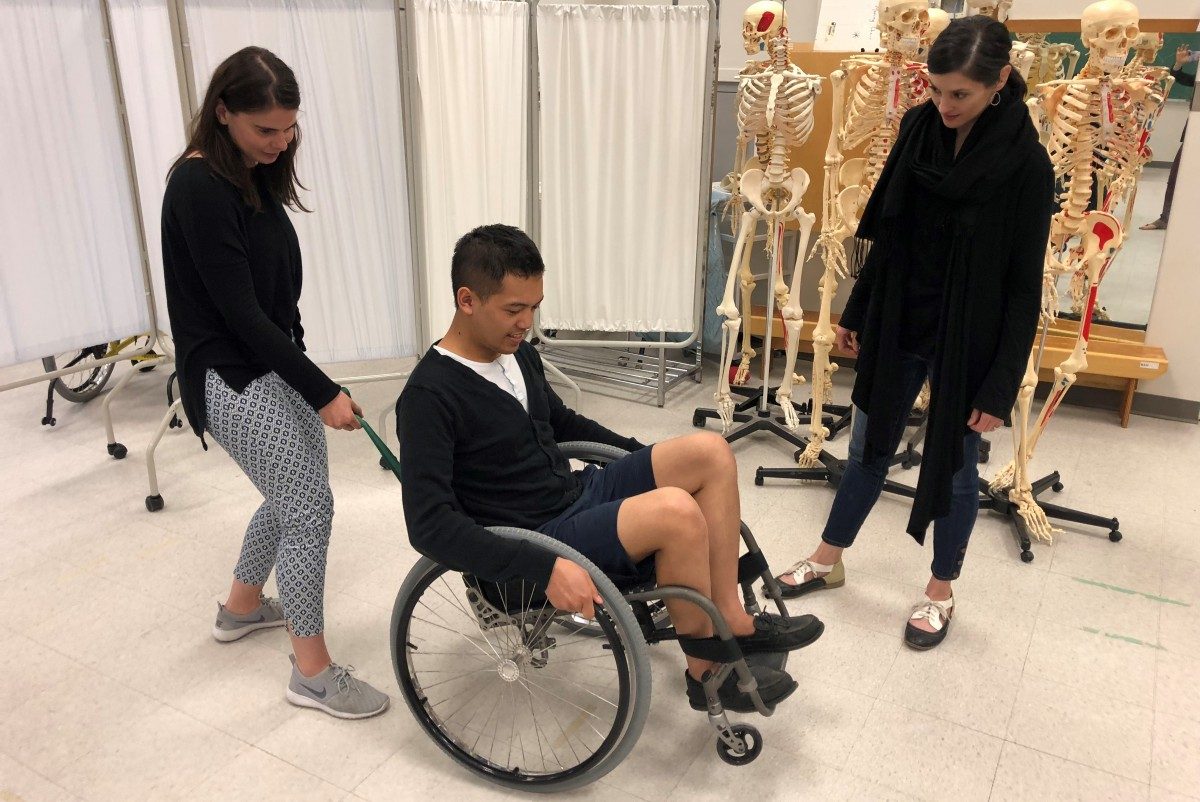
Wheelchair skills boot camp preps OT students for practice
An innovative “boot camp” designed to train occupational therapy students in wheelchair skills has increased the learners’ capacity in manual wheelchair use as well as their confidence to train and assess wheelchair skills, a study by three Master of Occupational Therapy (MOT) students at the University of Manitoba has found.
Second-year students CindyMarie Mack, Jason Robillon and Nikita Carreiro completed what they believe to be the first study evaluating occupational therapy students’ confidence to assess an individual’s wheelchair skills as well as teach them new skills to apply in clinical practice.
The goal of the Independent Study was to gauge the impact of the boot camp in the short and longer term. The four-hour ‘boot camp’ has been run as part of the MOT curriculum for several years by Dr. Ed Giesbrecht, Associate Professor, College of Rehabilitation Sciences, Rady Faculty of Health Sciences.
“Occupational therapists are the clinicians that typically teach wheelchair skills to the individuals who are newly prescribed a wheelchair,” said Mack. “So we’re the ones who need to know the skills to transfer them along. An individual’s ability in their wheelchair affects their participation and quality of life. The better their skills, the better their quality of life.”
Three quantitative measures were used to assess perceived manual wheelchair (MWC) skill capacity, confidence in manual wheelchair skills and confidence in assessing, training, spotting, and documenting manual wheelchair skills.
Forty-two boot camp attendees filled out self-reporting questionnaires before and immediately after the session and then four months later. The four-month follow-up was aimed at demonstrating how well students retained what they took away from the hands-on boot camp.
The study found that students’ confidence and skills significantly increased, statistically, across all measures, and gains were retained in all but one measure, that of perceived MWC capacity. Qualitative results collected at the four-month follow-up also revealed an increase in students’ empathy towards wheelchair users – despite the fact that the boot camp did not directly address empathy.
Some participating students thought there wasn’t enough time in the boot camp to master the higher level wheelchair skills taught to them. Others suggested that skill retention could increase with a shorter secondary boot camp or more opportunities to practice the skills developed in the primary boot camp.
Previous studies have looked at what education wheelchair skills users are receiving and showed that education across Canada is varied.
“We hope that people will see our results and understand the effectiveness of boot camps like this. Maybe other occupational therapy programs or even practicing clinicians will see the benefits and seek training like this at school or as professional development,” said Robillon
The boot camp has been at times an optional component of the College’s MOT program, but Mack, Robillon and Carreiro believe their results prove how important and effective it is in preparing occupational therapy students to work with wheelchair patients in the future.






